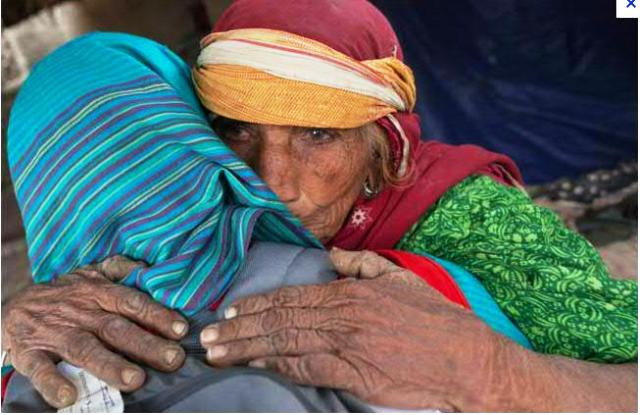The piece did not receive many comments either on the website or my personal blog where I cross post my work, but I got a lot of emails - some from regular readers who liked my ideas, and one from an Indian grandfather who wanted a safer Delhi for his two young granddaughters.
"Thanks for a very thoughtful blog. I really enjoy your writing. Please keep it up. Happy new year to you. As a grandfather with two granddaughters, this crime in Delhi has become more than a horrific crime. It has become a very personal thing. We really have to change the attitudes of males in our part of the world. Hope this vent brings about some change."
Some emails were from women in Pakistan saying that things are worse in the country and that at least Indians are protesting and have taken to streets. Had this incident happened in Lahore, they said, we would not have even known about it. A few emails came from sisters from across the border appreciating the support and concern from their neighbours.
I want to thank you all for reading it and feel humbled by your responses.
While people generally appreciated what I wrote, I got a few emails and tweets (all from Indian men) saying that I should focus on women rights violations in Pakistan and leave India to Indians.
One even pointed out that I have never written about the plight of Hindu girls like Rinkle Kumari and chose to write about Jyoti Singh Pandey. Another likened me to Ajmal Kasab and said some choice words about Pakistanis butting in their noses where they are not needed.
Indians with narrow nationalism are not the only ones who question what I write. I get asked by Baloch dissidents why do I not write about them; I get asked by the pan-Islamic zealots why do I not write about atrocities in Gaza and American aggression in Afghanistan and Iraq.
While I do respect anyone fighting for liberty and dignity, I am not a professional bleeding heart and would not write about everything that is the hot topic of the day. I don’t touch Baloch issues because I feel I am not equipped enough to write about them and there are far better writers who take on that cause in a much more effective manner.
I don’t write about struggles in Bahrain and Palestine because they are far removed from my reality and writing about them just for the sake of writing about them is kind of pointless. Honestly, I feel flattered when people tell me or expect me to write on issues that matter to them – as if me writing about them would make a difference – but it is impossible for anyone (unless that person is Ansar Abbasi) to write about everything under the sun, so I refrain from doing that.
As for the Indians who believe I should first write about the Rinkle Kumaris of Pakistan, I do feel very strongly about the minority rights and have written about them repeatedly, but Jyoti’s plight moved me like Rinkle’s couldn’t. Probably because as an urban resident of a big city who has used public transport and faced threats like harassment, insecurity, robbery day in, day out on the streets of Karachi, I empathise more with Jyoti than I do with Rinkle and feel strongly about it.
It may not be correct and perhaps Rinkle deserves the same attention, but as a writer, I feel more confident when I write about things I strongly believe in or empathise with. Perhaps it is my inability to transcend the personal, but that is who I am and that is how I write.
I also want to point out the importance of sisterhood to those who are willing to understand that women draw strength from each other and if one of them stands up to reclaim their space or seek their rights, others also stand up either in support or to claim their respective rights.
I may not benefit directly from the rights movement in Indian right now, but if the rape laws get amended in India, I would be cheering up for my sisters there and will try to campaign for similar change here in Pakistan.
As far as significance of sisterhood is concerned, let me share a recent example.
A fortnight ago, my elder sister and I were flying to Karachi. The plane was packed and the flight attendants were busy serving the passengers. My sister pointed out that a man sitting in the lane in front of us is trying to get fresh with one of the flight attendants. I, too, started following their conversation. Initially it sounded like a bit of harmless chit chat, then he started asking inappropriate questions and the flight attendant became uncomfortable.
He asked her where she lived and also wanted her to give him her phone number. He also tried to touch her whenever she would hand her a glass of water and so on.
She moved away quickly, but then every time that girl would pass our section, he would stop her and ask her for something. When she went back to the galley, he followed her and said something to her after which her facial expressions changed and we gathered that it must have been something very improper.
Let me also point out that she was very young and probably joined the airline recently and was not sure how to approach the matter. I was quite incensed and wanted to take up the matter but my sister said that we should not intervene and let the flight attendant handle it. Though I was not too happy with it, I said okay.
A couple of minutes later the man who was harassing the flight attendant started chatting with his family member on the other side of the aisle with their bodies hanging out making it almost impossible for the flight attendant to move without touching them or addressing them to move.
My sister, who asked me to practice restrain, lost it at the temerity of those two Lotharios, and asked them if they can stay seated properly so that the others can move freely.
The main aggressor turned to my sister and asked her to stay out of it at which I, too, lost my cool and told him in no uncertain term what kind of a creep he is, preying on a young girl who cannot tell him off because of her professional duties, and just because she is serving him tea and coffee does not make her his personal chattel. I told him that any woman who works in public space is not there for his unwanted advances. When he said that I am insulting him, I said, even more loudly, that yes, I am publicly humiliating him so that other women should also see how one should deal with a cretin like him and everyone on the plane should know what a miserable excuse of a human being he was.
At this point, his mother who was travelling with him but was sitting separately went up to him and asked him to be quiet. A senior citizen suggested that he should be handed over to the airport security. Most encouraging was the fact that no one including the man’s family stopped us from standing up for the flight attendant.
A few minutes later the senior flight attendant who was at the other end of the plane came up and asked him if he was harassing the junior flight attendant and told him off - that he may have bought a ticket but that does not give him license to misbehave with the staff.
When the flight landed in Karachi, it took a little bit longer than usual for the doors to open and for the passengers to disembark. We found out that the senior flight attendant had called the ground security staff who detained the harasser from getting off the plane. The senior flight attendant at the gate who was seeing the passengers off thanked me for standing up for the junior flight attendant.
My sister and I don’t know what happened to that guy after we left the aircraft but what I do know is that incident helped a lot of women.
All the flight attendants got to know that passengers barring one view them as individuals with right to dignity at work. The junior flight attendant drew strength from the incident and I am sure that if anything inappropriate will happen to her in future, she is now better equipped to deal with it.
Other women who witnessed the incident learned that keeping quiet is not the answer and when you raise your voice, things change.
My sister who has lead a very sheltered life, stood up for someone else. Not only she felt great about that afterwards and had a sense of accomplishment, but she understands me better and respects my need for this crusade.
That man, and others who witnessed the incident, will think twice before doing something like that because they know that someone might retaliate and tell them off.
All in all, one stood up and other sisters drew strength, lessons and understanding from it all.
Sisterhood is important and I dedicate this post to all who understand it and stand for it. Misogyny is best fought in company of the sisters who are fighting it out on their own turfs no matter what part of the world they live in.
PS: This is a rather long personal rant, apologies if you did not know what you were getting into before you started reading it.
Read more by Tazeen here or follow her on Twitter @tazeen



COMMENTS
Comments are moderated and generally will be posted if they are on-topic and not abusive.
For more information, please see our Comments FAQ